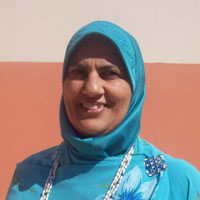Recovering from addiction: Long-term follow-through

Ayesha Hoorzook
One of IASA’s goals is to highlight the work of our members. In this issue of DMM News on Addictions and Attachment, we highlight the work of Ayesha Hoorzook of the Al Khaleel Drug Counselling Centre in South Africa.
Al Khaleel is a community-based organization in Brixton, South Africa that offers weekly free counselling to recovering drug addicts and their families. Ayesha Hoorzook is the head counselor at the centre and played an integral role in starting the group which was formed 12 years ago as a result of the alarming increase in substance abuse in the Asian community. This trend has now reached alarming proportions with children in their early teens and even younger turning to
recreational drugs.
Family Members Involved in the Process
Many of the addicts who attend the meetings have 
undergone treatment at one of the several rehabilitation centres in and around Johannes-burg, and Al Khaleel’s aim is to continue that recovery process, as the abuser re-enters society. Recognizing that drug abuse has a devastating effect on entire families, the Al Khaleel centre encourages family members and friends of drug addicts to attend the weekly meetings. By doing so, they are able to interact with people in the same situation as themselves and benefit from sharing their experiences.
Counseling Gets to the Heart of Issues
Al Khaleel provides a healing way to deal with personal, deep felt issues that pushed the addict in to the cycle of addiction. These include concerns about relationships, serious illness or loss, feelings of not belonging or emptiness. Weekly sessions help bring to light hidden dynamics which can entangle addicts in prolonged suffering, such as intergenerational confusion. To quote Robert Bly, “..Society prizes a state of half-adulthood, in which repression, discipline, and the Indo-European, Islamic, Hebraic impulse-control systems are jettisoned. The parents regress to become more like children, and the children, through abandonment, are forced to become adults too soon, and never quite make it.”
At Al Khaleel, addicts and their family members and friends together explore ways to find their place in their family system and how they might be entangled as a result of intergenerational confusion.
Compassion Yields Results
As one family member remarked, “We share true stories of the drug addict we serve, which describes the psychosocial deprivations that make addiction hard to manage. Addictive substances and behavior influence brain chemistry. The addict’s nuanced understanding of pleasure seeking and pain avoidance inspires empathy for a wide range of addictions—from cocaine and alcohol to destructive patterns of shopping, eating, and sexual behavior. The group’s audible compassion makes us hear these stories and consider this information with an open heart. Furthermore the true engagement of the counselor together with the group members makes this a moving invitation to the complex world of addiction.”
Congratulations to Ayesha Hoorzook and her team of volunteer counselors for their outstanding work.
Ayesha Hoorzook
Suggested Citation: Hoorzook, A. (2012, May). Recovering from addiction: Long-term follow-through. DMM NEWS, 12. Retrieved from https://www.iasa-dmm.org/newsletter/view/may_2012_-_drug_counseling_centre/